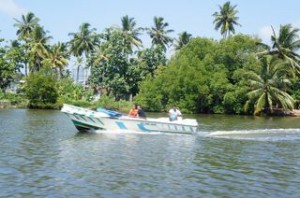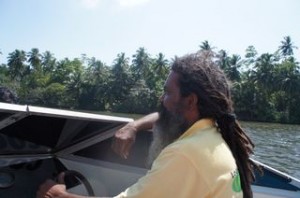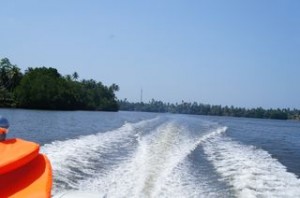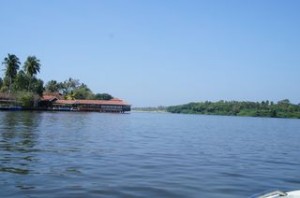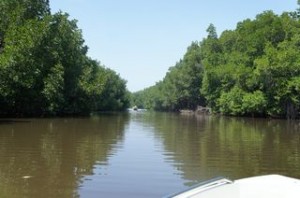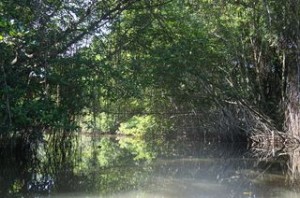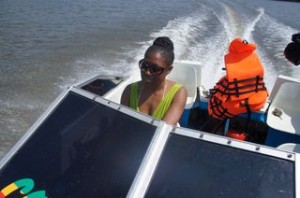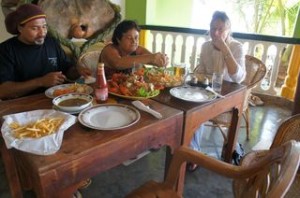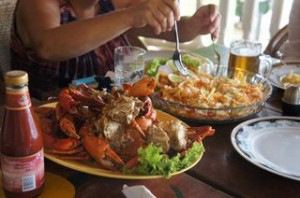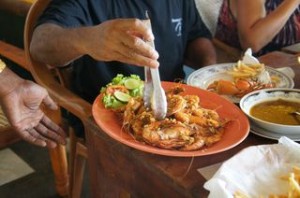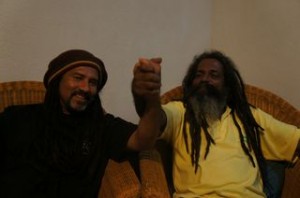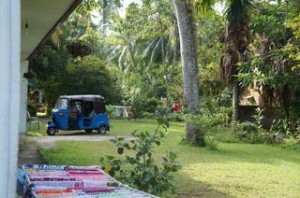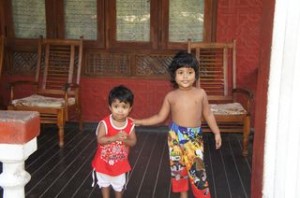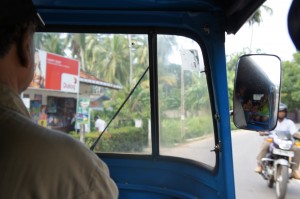For the last couple of days, Sid and Uncle Emil have been asking me if I want to go on a ride in the speed boat. I’d say, “Sure!” They’d swim out undock the boat and gas it up. Sid would ask, “Are you ready?” I’d say, “Yes. Let’s go.” Then Uncle Emil would suggest a test drive first. After giving the boat a few smokey starts and moving slowly back and forth along the reef, they’d realize there was a problem with the engine or a part needed replacing. Uncle Emil would make a call and it would take a day or so for the appropriate fixes to take place. Today, after a watching Sid and Uncle Emil successfully skim along the waves of the Indian Ocean, I finally get to go on that ride.
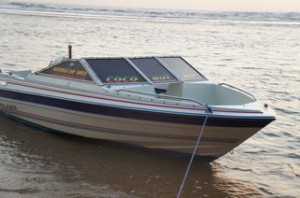 Sid positions himself in the front of the boat and I take the seat next to Uncle Emil. Sid crouches in the front shouting directions to help Uncle Emil navigate past hidden rocks along the reef and then watches to help avoid rough waves pushing toward the boat. When a large wave approaches we have to circle back towards the shoreline and and try to beat the next big wave to make our way to calmer waters. It takes a couple of attempts and butt-bouncing bumps across choppy surf before we make it. Once we make it past a rocky outcrop that seems to form the opening between the reef, the beach and the sea, we are on the Black River. We cruise past other boats with tourists aboard and river-facing resorts touting their ayurvedic treatments. We make foamy trails through the flat dark water as leafy green trees seem to part before us. I imagine this place is like the Florida Everglades even though, I’ve never been. Sid and Uncle Emil talk of the crocodiles that inhabit the place and they point out the wooden tips of fishing traps with birds resting atop them, along with reeds jutting out of the water that Uncle Emil says is cork. We continue down the river, passing fishermen in small canoes and under a busy underpass carrying cars back and forth through Aluthgama, the sister town to Beruwela and Moragalla. We stop at a batik and leather goods shop on the river and wave at another one of Sid’s relatives who owns the place. As we go farther down the river, the trees start to drip and droop towards us and we have to duck entangling vines. The engine sputters and we pause to figure out the problem, floating in the quite mangroves. With more gas added and a few switches flipped we continue a bit farther and then start the return trip. Back out on the open river, Uncle Emil turns the wheel over to me and I’m thrilled. I’m tentative at first, gripping the wheel tightly and bearing straight ahead. There’s no pressing of the gas or breaking, just steering. Uncle Emil and Sid help me navigate the natural curves of the river. I start to enjoy weaving back and forth and the power of holding the wheel. I have to relinquish the wheel as we approach the place where the mouth of the river and the ocean meet, so that we can tackle the fast-crashing waves on our way back to the Coconut Bar. Sid is crouching again, looking like a horse jockey, shouting to watch out for the waves. It is much harder reentering the reef this time. The waves seem to be relentless, coming faster, rhythmically. We approach, then we are turned back by the foaming, pushy waves. The boat skips and makes hard bounces with each attempt to pass. We finally make it back safely to our lazy reef on about the fourth attempt.
Sid positions himself in the front of the boat and I take the seat next to Uncle Emil. Sid crouches in the front shouting directions to help Uncle Emil navigate past hidden rocks along the reef and then watches to help avoid rough waves pushing toward the boat. When a large wave approaches we have to circle back towards the shoreline and and try to beat the next big wave to make our way to calmer waters. It takes a couple of attempts and butt-bouncing bumps across choppy surf before we make it. Once we make it past a rocky outcrop that seems to form the opening between the reef, the beach and the sea, we are on the Black River. We cruise past other boats with tourists aboard and river-facing resorts touting their ayurvedic treatments. We make foamy trails through the flat dark water as leafy green trees seem to part before us. I imagine this place is like the Florida Everglades even though, I’ve never been. Sid and Uncle Emil talk of the crocodiles that inhabit the place and they point out the wooden tips of fishing traps with birds resting atop them, along with reeds jutting out of the water that Uncle Emil says is cork. We continue down the river, passing fishermen in small canoes and under a busy underpass carrying cars back and forth through Aluthgama, the sister town to Beruwela and Moragalla. We stop at a batik and leather goods shop on the river and wave at another one of Sid’s relatives who owns the place. As we go farther down the river, the trees start to drip and droop towards us and we have to duck entangling vines. The engine sputters and we pause to figure out the problem, floating in the quite mangroves. With more gas added and a few switches flipped we continue a bit farther and then start the return trip. Back out on the open river, Uncle Emil turns the wheel over to me and I’m thrilled. I’m tentative at first, gripping the wheel tightly and bearing straight ahead. There’s no pressing of the gas or breaking, just steering. Uncle Emil and Sid help me navigate the natural curves of the river. I start to enjoy weaving back and forth and the power of holding the wheel. I have to relinquish the wheel as we approach the place where the mouth of the river and the ocean meet, so that we can tackle the fast-crashing waves on our way back to the Coconut Bar. Sid is crouching again, looking like a horse jockey, shouting to watch out for the waves. It is much harder reentering the reef this time. The waves seem to be relentless, coming faster, rhythmically. We approach, then we are turned back by the foaming, pushy waves. The boat skips and makes hard bounces with each attempt to pass. We finally make it back safely to our lazy reef on about the fourth attempt.
We leave the Coconut Bar boat to rest on the sand as we take to our cane chairs to share a drink and rest in the sun. Besides providing a little adventure, the boat is a part of another service that the Coconut Bar provides, lifesaving. The words Beruwela Bay Watch are tattooed on the side of the boat. No Pamela Andersons or David Hasselhoffs in this lifesaving club, only lifeguards that double as bartenders. Uncle Emil felt the service was necessary after watching one too many tourists get into trouble out on the ocean. He tells me that he wants to connect with other real bay watchers to let them know that there is a lifesaving team in Sri Lanka, too.
Uncle Emil gathers a few friends for lunch after our river journey. We are joined by his friend Susanna, a German woman who imports his gems and jewelry designs to Europe along with his best friend Bony and his wife who live in Switzerland. I learn that this is a big reunion for Bony and Emil who had a falling out sometime ago, over what, who knows. Bony says they are both very stubborn which kept them apart longer than it should have. You get the sense that these men have been through a lot together and they seem to fall back into an easy friendship with one another. Lunch is quite an international gathering, folks are moving easily from Sinhalese to German and English and we are having fresh crabs and prawns again. Bony has bought his own homegrown spirit for us to taste a mixture of banana, pineapple, mango and coconut wine and it’s got kick. It’s the color of dishwater and reminds me of the “jungle juice” that some guys in my freshman dorm made in a trash can. Having said that, I kind of like it. Bony tells me that he grew up together in nearby neighborhoods, one poor and one well off, but they were friends. Today, they both wear locs and prescribe to Rasta culture and tenets. They are real brothers. Bony asks if we can talk politics. He wants to know about President Obama. He told me that he felt that his election was good for brown people everywhere. He wondered why people in the US didn’t seem to be supporting him. I explain that there are a lot of people that want to defeat him in the next election. He hopes that Obama wins.
I end up spending more time with Bony, Uncle Emil, Sid, his cousin Mahesh, who also works at the Coconut Bar, and his Uncle Sucil. Sid and I wanted to have dinner with his sisters and nieces, but he let them know too late and then they felt they weren’t prepared to entertain. Sid says Sri Lankan women are very shy around strangers, so I hang with the guys. We are at Sid’s guest house, Uncle Emil has bought wine and food from Chuti and we add this to a few dishes that Iresha has prepared for us to make our dinner. It’s the first time that I dine Sri Lankan style, using my right hand to scoop and make small balls of food to pop in my mouth. Sid cranks the reggae, Bob Marley, Afro Blondie and others. I listen to them joke and tease one another in Sinhalese while Sid attempts to translate. I’m not sure that I’m getting the full translation, I’m sure the conversation is more laced with curses and other profanities that they’d like to keep from my ears. It’s cool being in the midst of their camaraderie, even though I don’t understand everything that they are saying. I am most intrigued by the stories of his Uncle Sucil. He’s ex-military and was on the front lines of fighting in Sri Lanka’s recent Civil War between the government and the Tamil Tigers. The Tamils, a minority group in the North of the country, wanted to cede from country and create their own country. Some have said that they are the originators of modern terrorism, employing suicide bombers and other surprise attacks. Sid himself just barely escaped an attack while he was a young student in Colombo. He was riding his bike when less than a mile ahead of him he saw a massive explosion. It turned out to be one of the worst suicide bombings during the war, killing over 300 people. He skidded from his bike and ran from the scene. It’s something he says he’ll never forget. But his uncle bears bullet scars from the country’s troubled past. As the story goes, he saw many members of his troop killed by Tamils and found himself sounded by Tamils along his remaining fellow soldiers. Sid’s uncle decides that he’s had enough and shoots his way out of the entrapment, getting shot himself in the process of escaping. The small man that I see sitting in from of me has the most immaculate manners that I’ve ever encountered in a person, saying excuse me directly to me when he leaves the table, and it is hard to imagine him fighting his way out of a northern Sri Lankan jungle. Uncle Emil says he fought his way out like he was Jean Claude Van Damme.
While Sri Lanka has survived a Civil War that ended in 2009, it still suffers from other small tragedies as we’d learn that evening. Sid’s cousin Mahesh received a call that one of his friends was horribly injured in a bus accident. Sid and I had already discussed how dangerous some of the buses can be. Drivers pack buses that don’t have doors and passengers hang outside in the line of reckless drivers. In this case, Mahesh’s friend was hit by a truck colliding with the bus. Mahesh was visibly shaken upon learning that his friend would loose his legs. The men come together to console Mahesh as best they can. Sid and Uncle Emil are angered that something like this can happen. It’s a sad way to end the day, but a reminder that Sri Lanka still has some growing to do.
